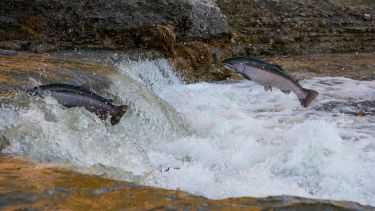Frances Payne
Understanding animal protection in food systems: A victim-based approach

About my PhD
My thesis seeks to understand the decision-making process behind how the needs of different types of animals are prioritised and protected in food systems. Specifically, I focus on the differing protection strategies for farmed and wild animals. My case study for this is Scottish salmon farming, for which there is much debate and discussion of the relationship between farmed salmon and wild animals. Therefore, my data collection targets interest groups who either influence or are affected by salmon farming.
Interviews, document analysis, and on-site observations with these groups can give insight into how and why different types of animals are viewed in food policy and whose interests are being prioritised and whose are being excluded, and why. Answering these questions will provide a framework that can be used to suggest an alternative model for improving the way we protect animals; one which fairly represents the priorities of different interest groups. If we are committed to developing sustainable food systems, we need to develop democratic food systems that prioritise food security, sustainability, and high welfare (for all types of animals and all humans), in order to ensure that practices are robust.
Why I'm interested in this topic
I developed an interest in the way that different types of animals are prioritised or marginalised in my undergraduate criminology studies, when I wrote my dissertation on the dichotomic standards of criminal justice for companion animals and agricultural animals. During my MA studies, I went a step further and interrogated the concept of justice in legal and illegal trade of animals. I focused on the exotic pet trade, which raised questions about how animals are viewed when they go from being ‘wild’ to ‘pets’. I also delved into political theory such as Rawls’ theory of justice and Robert Garner’s attempt at extending Rawls’ theory to animals, and I have been fascinated by the possibilities of combining political and criminological theory for animals. Since joining The Grantham Centre for Sustainable Futures at Sheffield, I have become increasingly interested in the relationship between animals and sustainability. This has led me to questions about how we can ensure that sustainability initiatives and animal wellbeing can work alongside each other, and whether we need to step back and evaluate how the dialogue of sustainability is considering animals.
What's new about my work
For my project, I am working with Nils Christie’s ‘ideal victim’ theory, which identifies socially constructed characteristics that determine how readily individuals are granted victim status. This, in turn, influences how such individuals are protected. As far as I am aware, my thesis is the first to empirically employ Nils Christie’s model of victim construction to the case of nonhuman animals. Moreover, my research builds on existing research which looks at how different species are victimised and protected, to explore how such processes occur for different ‘types’ of animals that may belong to the same species. This research is also significant in that it focuses on animals involved in the food industry, who are often excluded from victimhood narratives.
Additionally, for my research methodology, I am exploring the emerging method of multispecies ethnography. This approach is used to centre animals in animal studies research. This involves techniques such as empathetic narratives, which I will combine with field observations to centre the animal experience in research findings and discussions. Ultimately, this combination of theoretical and methodological approaches ensures a focus on individual animals, beyond broad grouping of animals.
What I hope to achieve
By focusing on how and why farmed salmon and wild salmon are protected differently, we can begin to understand some of the drivers behind how animals are conceptualised and how they are treated. Developing an understanding of factors which determine victimhood construction and consequent protection strategies can be applied more broadly to help us understand the drivers of our political systems. Ultimately, this will help to map a model for how we can improve animal protection in a way that accounts adequately and sustainably for democracy, security, and welfare in our food systems.
What's most interesting to me about my research
I most enjoy speaking to people coming from different angles in the salmon arena. I am so grateful for the time and knowledge that the people and organisations I’ve worked with have given me. Listening to their experiences, learning about their work, and being able to see the wide picture from so many varying viewpoints and backgrounds has been a thoroughly fascinating experience.

